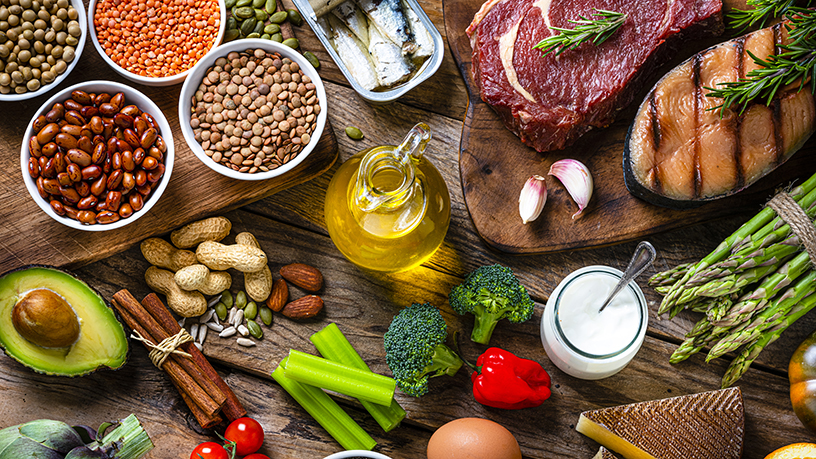On this page
Key takeaways
- Protein is a powerhouse macronutrient, standing alongside fats and carbs as one of the essential nutrients your body needs daily.
- It is vital for keeping your muscles strong, bones sturdy, joints moving smoothly, and helps you manage appetite and weight.
- The amount of protein you need depends on your age, lifestyle, and health goals.
Once the domain of bodybuilders and diet plans, protein has muscled its way into the mainstream, now starring in everything from viral recipes to rebranded snack packs.
Protein is having a moment, but is it really worthy of the hype? And how much do you actually need to eat every day?
What is protein?
Protein is one of the 3 main macronutrients our bodies need to function, alongside fats and carbohydrates.
While carbohydrates provide energy and fats support hormone production and cell health, protein plays a unique and critical role in building and repairing tissues.
“Protein is like the building block of all the cells in our body,” says Bupa Dietitian, Riley Kusuma. “It’s an essential part of our diet.”
Why do I need protein?
Protein plays a role in nearly every biological process in the body.
“Protein is made up of amino acids,” explains Riley Kusuma. “Our bodies rely on these amino acids for a wide range of functions, like producing hormones, repairing muscles, supporting bone strength, and maintaining healthy joints.”
“Protein can also serve as an energy source when needed.”
There are some amino acids that our body cannot make, so it’s important to include a variety of protein-rich foods in our diets each day to support everything from immune function to muscle repair, even the growth of our hair and nails.
Protein can help:
Increase muscle mass
The amino acids in protein act as building blocks for muscle tissue. Keeping your protein intake high can also prevent muscle loss during weight loss.i
“Maintaining muscle mass is important as we get older as it helps us be able to do everyday things; from carrying shopping to simply getting up out of a chair,” says Riley.
Keep you fuller for longer
“Protein is satiating, which means it keeps us fuller for longer,” says Riley. “This is because of the impact it has on hormones that control our hunger and fullness cues.”
Protein can play a key role in helping with weight loss. It acts as an appetite suppressant by reducing levels of the ‘hunger hormone’, ghrelin.
It also increases levels of 2 other hormones that are responsible for digestion and for telling the body that you’re full.ii
Boost metabolism
Protein has the highest thermic effect, meaning it takes more energy to digest it than other macronutrients.
Improve injury recovery
“Your body uses protein to control inflammation, and stimulate muscle and tissue growth,” says Riley.
Protein can also help recovery after illness. “Protein helps make antibodies that fight off infections, keep cells healthy and create new ones. It also fuels your energy.”
How much protein do I need each day?
The amount of protein you need depends on your age and gender.
It’s recommended that:
- Adult males consume 0.84g of protein for every kg of body weight
- Adult females consume 0.75g of protein for every kg of body weight
Some people might need more protein. People over 70, and pregnant or breastfeeding women need around 1g of protein for every kg of body weight.
It’s important to remember that 100g of chicken doesn’t contain 100g of protein.
“To find out how much protein a certain food contains, you can use a food tracking app or the nutrition information panel on packaged foods,” advises Riley. There are a range of free apps, like My Fitness Pal which give you a macronutrient breakdown of everything you eat.
What happens if I don’t eat enough protein?
“True protein deficiency isn’t common in Western countries,” says Riley.
However, if your diet is low in protein, you may experience some of the following:
- Oedema (swelling)
- Muscle wastage
- Brittle nails and hair
- Dry skin
- Anaemia
Can I eat too much protein?
If you’re consuming more protein than you need, it can contribute to weight gain. That’s simply because you’re taking in more calories than your body requires.
Like any other macronutrient, excess protein is stored as fat or excreted as waste if it’s not used.
It’s also important to consider where your protein is coming from.
“Anyone with existing cardiovascular disease should limit their red meat intake to no more than 350 grams a week,” Riley advises.
Processed meats and fatty cuts can raise cholesterol levels and increase the risk of heart disease, so balancing your protein sources is key. Lean meats, poultry, fish, eggs, legumes, dairy, tofu, and nuts offer heart-healthy alternatives that still pack a protein punch.
Do I need protein supplements?
Most people don’t need supplements.
“Generally, we get enough protein just by eating a balanced diet,” says Riley. “But in some cases, protein powders can be helpful, especially if you have higher needs that are hard to meet with food alone.”
That might include people who are recovering from surgery or illness, aren’t feeling well enough to eat large meals, or those training hard, like athletes. In those situations, supplements can be a convenient way to top up your intake.
“But ideally, you want to get your protein from real food,” Riley adds. “Whole foods give you more than just protein, they also come with other important nutrients like vitamins, minerals, and fibre that you won’t get from a powder.”
Need some advice?
Call us on 1300 030 238 (Mon-Fri, 9am-5pm AEST) to speak with one of our health professionals or register for a call back to find out what programs are available to you.
Resources
Nutrition Australia offers information and fact sheets on healthy eating.
Eat For Health has information about food essentials and The Australian Guide to Healthy Eating.

At Bupa, trust is everything
Our health and wellbeing information is regularly reviewed and maintained by a team of healthcare experts, to ensure its relevancy and accuracy. Everyone's health journey is unique and health outcomes vary from person to person.
This content is not a replacement for personalised and specific medical, healthcare, or other professional advice. If you have concerns about your health, see your doctor or other health professional.
iJeju National University School of Medicine, Korea (2020) Clinical Evidence and Mechanisms of High-Protein Diet-Induced Weight Loss. Jeju National University School of Medicine.
ii Department of Community Nutrition, School of Nutrition and Food Sciences, Shiraz University of Medical Sciences, Shiraz, Iran (2020) Effect of short- and long-term protein consumption on appetite and appetite-regulating gastrointestinal hormones, a systematic review and meta-analysis of randomized controlled trials. School of Nutrition and Food Sciences.
You might also like
5 ways to eat more protein
Boost your energy, curb cravings and support your muscles with some surprisingly simple ways to eat more protein.
Strength training: What you need to know
Starting a fitness journey can be overwhelming, especially when you’re trying something new. Discover the basics and benefits of resistance training.
How to prevent osteoporosis when you’re young
Osteoporosis weakens bones, affecting quality of life as we age. Learn how to reduce your risk in your younger years.
What causes osteoporosis and how to lower your risk
Osteoporosis occurs when your bones break down faster than they can repair themselves. Learn the causes, symptoms and treatment options for this common condition.





